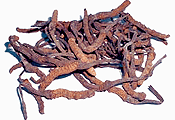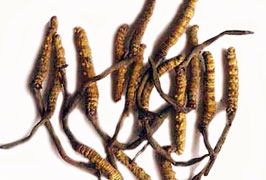| Cordyceps sinensis - Yartsa Goenbub in Bhutan |
 |
Bhutan's Nature Yartsa Goenbub |
|
 |
Bhutan's Nature Information |
|
|
 |
| Cordyceps
harvesting legalised |
June
2004
 |
People
in the higher regions of Paro, Thimphu, Wangduephodrang, Gasa, Lhuntse,
Trashigang, Trashiyangtse, Haa, and Bumthang can now harvest the Yartsa
Goenbub (Cordyceps sinensis) legally, following a royal command issued
by His Majesty the King on June 17, 2004.
In
2002 the harvesting of the cordyceps was legal only in Lunana geog under
Gasa dzongkhag where the living condition of about 158 households has reportedly
improved. |
 |
| Farmers
are permitted to collect the plant |
"The
people are now able to buy more rice, chillies, better clothes and renovate
their houses," said the Lunana gup, Dorji Drolek. "Every year each family
sells about two kgs of cordyceps worth Nu 20,000 to Nu 60,000 a kilogramme.
"The whole geog combined makes over Nu 200,000-500,000 a year."
"The
farmers are allowed to harvest and sell the cordyceps on condition that
they do it on a sustainable basis," said the agriculture marketing services
officer, Sonam Tobgay. "Long term sustainability should be the focus."
 |
Cordyceps
sinensis
The
cordyceps grow from May 1 to the beginning of July and farmers are permitted
to collect the plant from June 1 to 30. The government will charge a royalty of 10 percent from what farmers
earn selling the cordyceps to the authorised buyers and exporters.
Until
last year the forest and nature conservation act prohibited farmers from
harvesting and selling the cordyceps. But some farmers in the cordyceps
growing areas were known to have been harvesting the plant illegally and
selling it across the northern border. |
A
Wangduephodrang businessman, Rinchen, said that earlier people in his geog
sold cordyceps to medical institutes in the country as well as to buyers
outside. "They would sell it for Nu 30,000 to Nu 50,000 a kilogramme,
depending on the quality," said Rinchen, adding that it was frustrating
to see cordyceps grow in their village and not be able to harvest them.
"Yartsa Goenbub grows in our villages and we can only watch it die," said
another Wangduephodrang businessman, Norbu. "But there were those who harvested
and sold them without government's knowledge."
According
to studies conducted by the ministry illegal trade with Tibet in
the past had incurred a loss of about Nu 180 million to the government.
The agriculture ministry says that it is not necessary for farmers to procure
licenses to sell the plants to authorised buyers. "But to export cordyceps
to other countries like Hong Kong, farmers or the buyers will have to obtain
a license," said Sonam Tobgay. He added that, in near future, Bhutanese
cordyceps could be sold in California where there was an interest in buying
the plant. It is believed that the Bhutanese cordyceps are of premium quality.
top
According
to the agriculture ministry, if the people of a particular village were
caught taking the cordyceps across the border and selling them without
a license it would result in confiscation of the plant or proceeds from
its sale along with compensation at the market value. "Continuous violation
of rules will lead to suspension of harvesting and collection of cordyceps
in that particular area," said a ministry spokesperson. The agriculture
ministry will fix a floor price for farmers to sell the cordyceps to authorised
buyers on June 24, 2004. "For instance, if we fix the floor
price at a minimum cost of Nu 100 a kilogramme,
the farmers may go beyond it, but cannot sell it for less," Sonam Tobgay
said. "Without a floor price our farmers could get manipulated."
Cordyceps
sinensis is a highly valued medicinal mushroom used in clinical medicine,
as a household remedy and as an over all tonic.
top
To
make the cordyceps transaction official the agriculture ministry has made
a transaction form in which the buyers will have to fill up how many kilogrammes
of cordyceps they buy from the farmers and for how much. "The transaction
between the buyers and the sellers should take place in presence of the
sales committee comprising the gup and a forestry official who will be
the witness," said the agriculture marketing services officer, Sonam Tobgay.
Buyers
can go to any cordyceps growing places and buy the plant and after having
bought the plant from the farmers, they will have to get a clearance from
the Bhutan Agriculture Food Regulatory Authority which will issue
a certificate to the buyers wanting to export it to other countries.
"The
certificate will maintain that the package contains cordyceps to avoid
buyers getting into problems with the forestry and customs personnel when
they export it to other countries," said an agriculture officer.
 |
| This
article was contributed by Kuensel, Bhutan's national newspaper 2004 |
|




